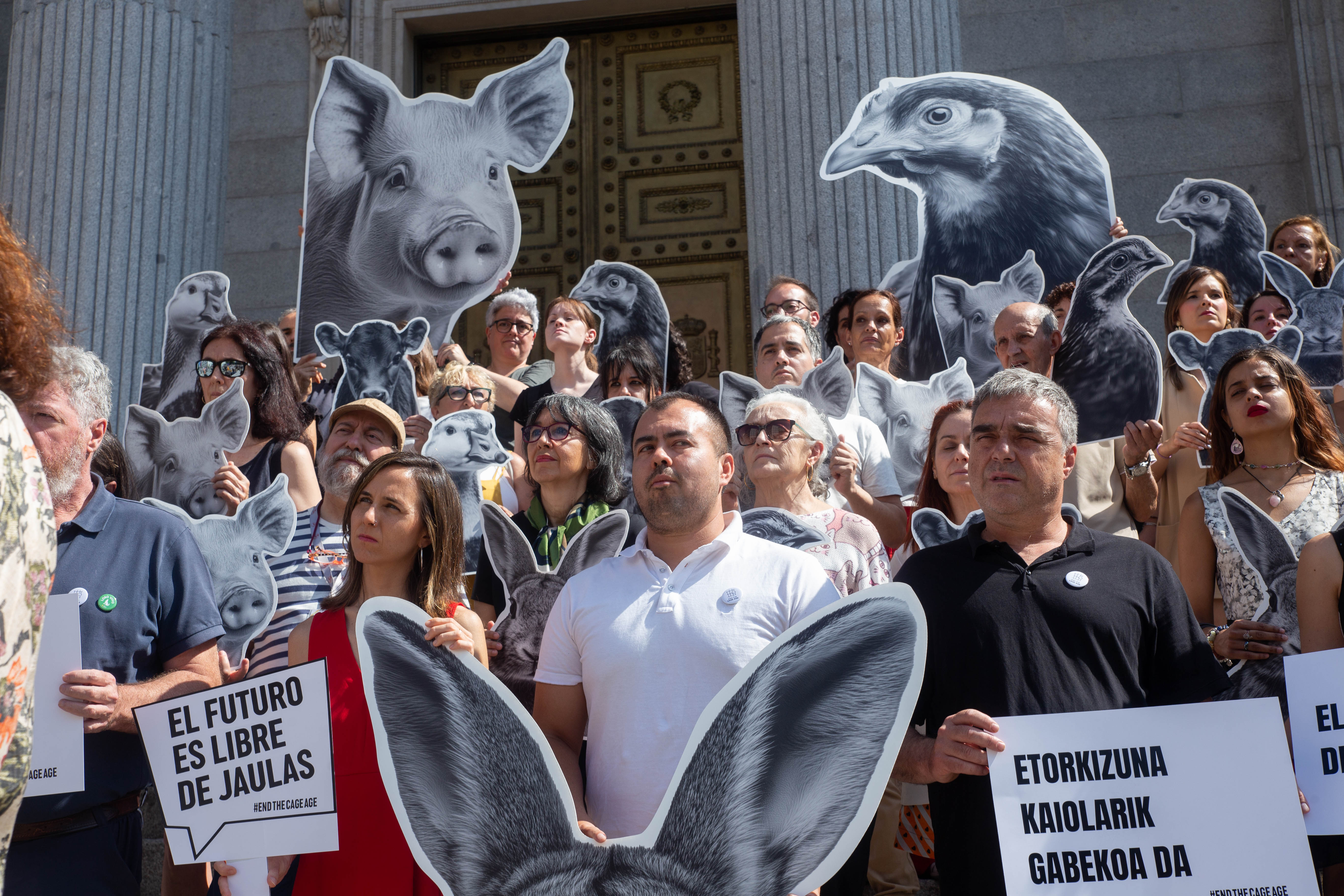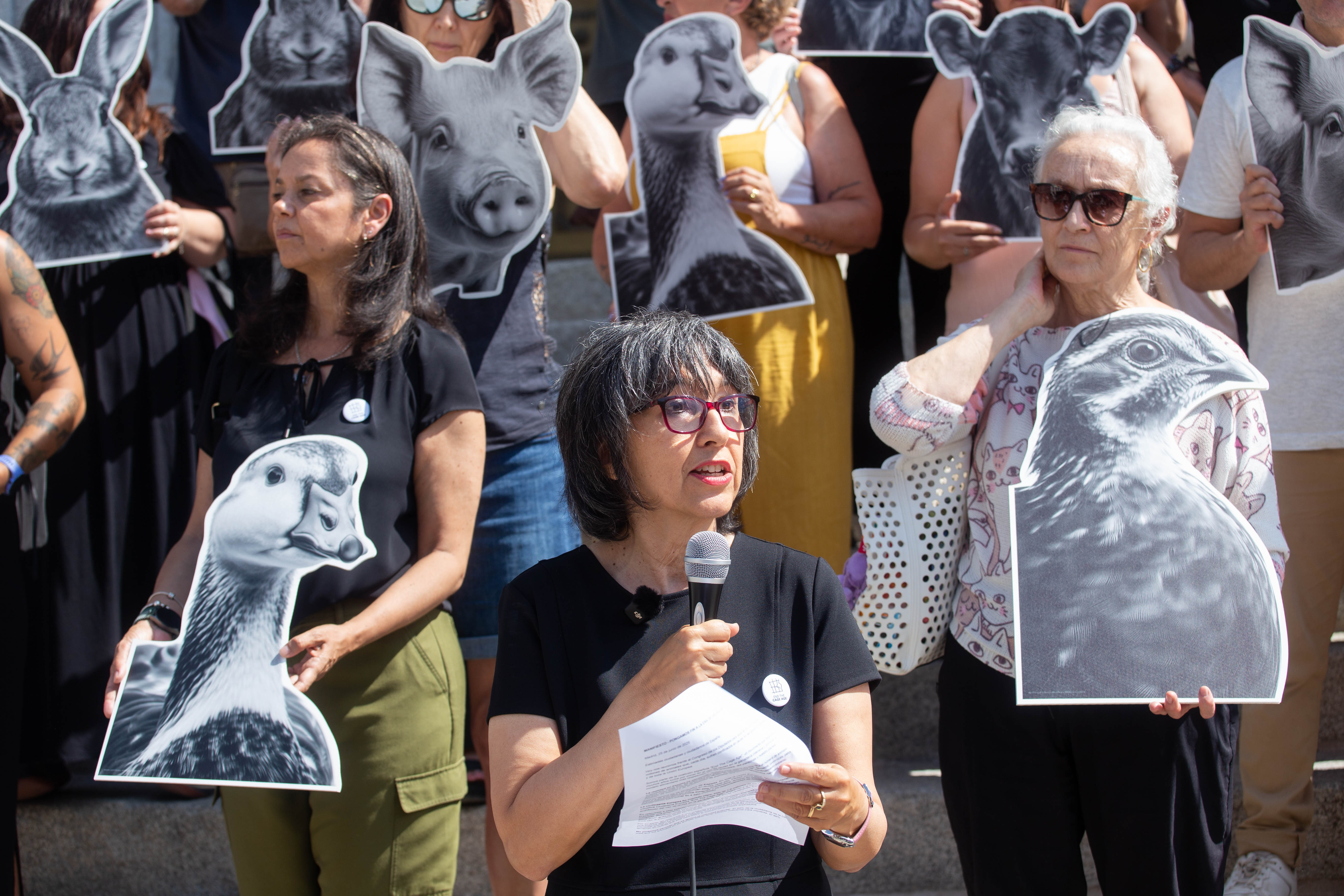This morning, outside the Congress of Deputies in Madrid, member organizations of the End The Cage Age coalition—including AnimaNaturalis—staged a mass demonstration demanding an end to cages on all European Union farms. Through giant banners depicting the harsh reality of animal confinement, a manifesto reading, and the presence of political figures from multiple parties, the event highlighted the urgency and strength of a citizen-led initiative that delivered over one million signatures through a European Citizens' Initiative.
"Cages are prisons that deny even the most basic instinct: to stretch their wings, walk, or see sunlight," declared Aïda Gascón, Director of AnimaNaturalis Spain, during the event. "Today we give voice to millions of animals silently suffering on our farms and demand Spanish deputies take a stand against this grave situation."
The European Citizens' Initiative (ECI) "End The Cage Age" surpassed 1.4 million validated signatures from at least seven member states in 2021, aiming to secure a timeline from the European Commission to phase out cages in farm animal production.

In its official response on July 1, 2021, the European Commission committed to present a legislative proposal by the end of 2023 to gradually ban cage systems for various species—including laying hens, sows, calves, and other animals mentioned in the ECI such as rabbits, ducks, and quails. However, this deadline has been repeatedly missed, leading the promoting organizations to file a lawsuit with the Court of Justice of the European Union to enforce the commitments.
- Spain leads Europe in caged animal numbers: Over 87% of animals farmed for consumption in Spain endure extreme confinement without space or stimuli to express natural behaviors.
- Laying hens: Spain houses 23% of the EU's caged hens, equivalent to over 90 million birds.
- Rabbits: Second-largest European producer, with 99% raised in cages.
Additionally, over 300 million animals remain caged annually across the European Union, underscoring the scale of the animal welfare crisis the ECI seeks to address.
Specific Demands to Spanish Deputies
The rally urged parliamentarians to address four key questions in their next parliamentary intervention:
- Government Position: What is the Spanish Executive's stance on upcoming EU animal welfare legislation, and what official response will it send to Brussels?
- Regulatory Adaptation: How will Spain adapt national regulations to incorporate cage bans for all farmed species?
- Financial Support: What measures and Common Agricultural Policy (CAP) funds will be allocated to support farmers' transition to cage-free systems?
- Stricter Standards: Is Spain prepared to implement animal welfare standards exceeding EU requirements if deemed necessary?
"Without concrete support, the transition will be unequal. We need a plan with timelines and resources—not just speeches," warned Gascón before concluding the manifesto reading.
Despite the Commission's initial commitment, 2022 and 2023 passed without the promised legislative proposal. Following this failure, ECI organizations filed a lawsuit with the EU Court of Justice, which has yet to set a hearing date.
Concurrently, the European Commission has opened a Call for Evidence until July 16, 2025 to gather input on revising animal welfare legislation, including ending cages, with plans to present its final proposal next year. However, activists stress this process must not cause further delays but rather become the definitive step toward an effective ban.

Spain could become a European leader by adopting a bold proactive stance. A 2023 Eurobarometer revealed 89% of Europeans oppose individual cages, while free-range egg consumption grows 12% annually in Spain—despite 72% of production still coming from intensive systems.
"Beyond aligning with our values and public support, economic viability exists: more humane alternatives like adapting barns for free movement can prove cheaper long-term," noted Gascón, citing EFSA studies and other member states' experiences.
What Can You Do?
If you share our outrage at the extreme confinement of hens, sows, rabbits, and other caged species, act now. Visit www.granjas.org to sign AnimaNaturalis' official petition demanding a clear timeline from the Spanish Government and EU to eliminate cages on all farms. Your signature is crucial to demonstrate Spanish society won't tolerate this institutionalized cruelty.
Share the campaign using #EndCageAge on social media and encourage friends, family, and colleagues to join. Every signature and share brings us closer to a day when no farm animal lives caged, but in facilities respecting their welfare and natural behaviors. Act today and join the ethical revolution protecting those who cannot speak for themselves!


